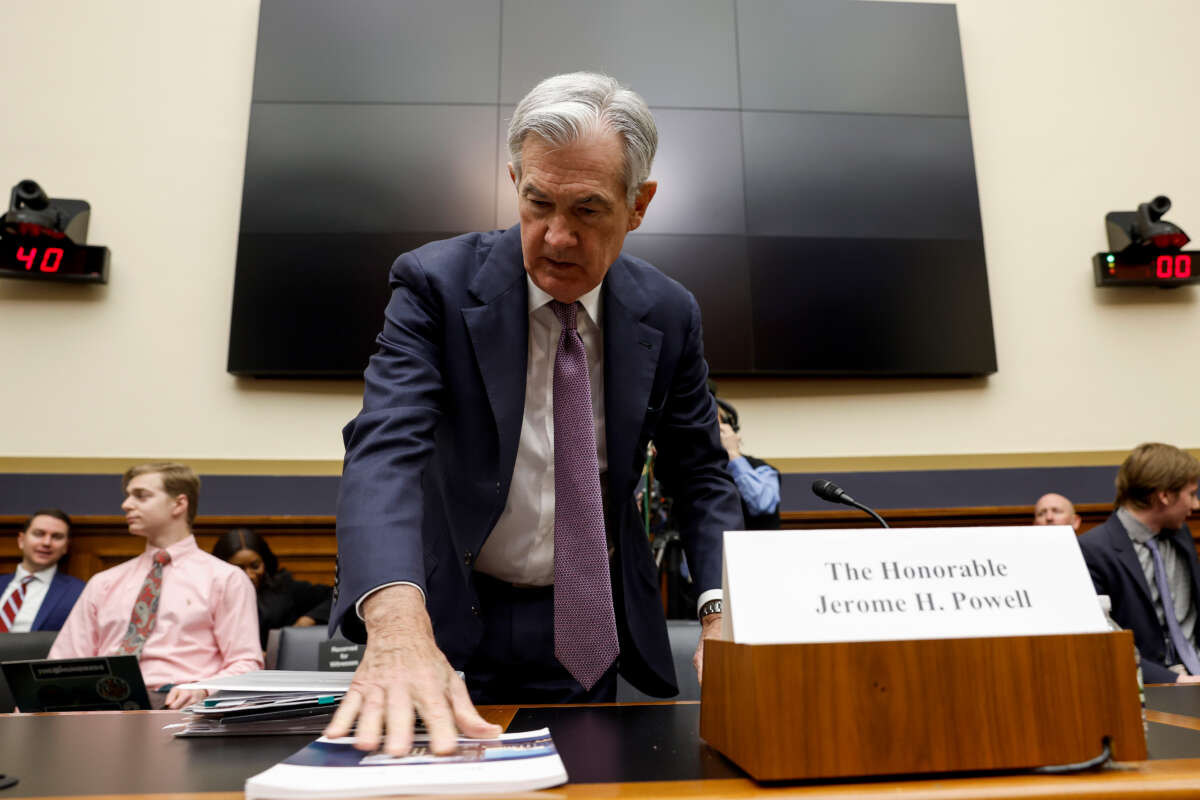Support justice-driven, accurate and transparent news — make a quick donation to Truthout today!
Sen. Elizabeth Warren (D-Massachusetts) is calling for Federal Reserve Chair Jerome Powell to recuse himself from his agency’s investigation into the Silicon Valley Bank failure because his actions directly contributed to the collapse, she says.
The Federal Reserve announced on Monday that it is opening up a review into the “supervision and regulation” of Silicon Valley Bank after the bank failed on Friday, triggering fears of more widespread damage to the economy. The investigation will be led by Vice Chair for Supervision Michael S. Barr, the agency said, and its findings will be released by May.
Warren said that Powell — a holdover from the Trump administration that President Joe Biden renominated when he took office — should not be involved in the probe. “Fed Chair Powell’s actions to allow big banks like Silicon Valley Bank to boost their profits by loading up on risk directly contributed to these bank failures,” Warren said in a statement on Tuesday.
“For the Fed’s inquiry to have credibility, Powell must publicly and immediately recuse himself from this internal review. It’s appropriate for Vice Chair for Supervision Barr to have the independence necessary to do his job,” she continued.
The senator has been outspoken about the failure of Silicon Valley Bank. In an op-ed published in The New York Times on Monday, she pinned the blame for the failure on deregulation of banks, as carried out by Congress, former President Donald Trump and the Federal Reserve. Because of the rollback of post-2008 recession Dodd-Frank regulations that could have prevented the bank collapse, she said, the public will now pay the price with the government bailout of large depositors at the bank.
“In 2018, the big banks won. With support from both parties, President Donald Trump signed a law to roll back critical parts of Dodd-Frank. Regulators, including the Federal Reserve chair Jerome Powell, then made a bad situation worse, letting financial institutions load up on risk,” Warren wrote.
She further said that his position of favoring deregulation of smaller banks “has put our economy at risk, and it needs to end — now.”
Warren is one of many people in the progressive sphere pointing to deregulation as a major reason behind the bank’s collapse, though few people have singled out Powell the way Warren has.
Sen. Bernie Sanders (I-Vermont) has also pointed to the 2018 repeal of Dodd-Frank regulations as the “direct” culprit of the collapse, noting that Dodd-Frank was put in place precisely to avoid situations like the Silicon Valley Bank failure. “Have we learned nothing?” he asked during the debate over the repeal years ago.
The American Prospect’s David Dayen pointed out in a recent column that the 2018 bill not only nixed regulatory safeguards for small- to medium-sized banks, it also allowed the Federal Reserve, then under Powell, to even further weaken the rules for medium-sized banks like Silicon Valley Bank.
“In 2019, using this tailoring provision like Republican supporters of the law urged, [the Fed] removed the ‘modified Liquidity Coverage Ratio’ from banks under $250 billion (like SVB), a similar kind of emergency measure as in the enhanced regulatory standards,” Dayen wrote. “Then-Fed governor Lael Brainard condemned this ‘reduction in core resilience.’”
Though not directly related to criticism over regulatory repeal, Powell’s relentless quest to hike interest rates — which has been criticized by economists from across the political spectrum — over the past year also contributed to the failure of the bank. Silicon Valley Bank, unlike most other major banks, invested a large amount of its cash into Treasury and mortgage-backed securities which fell sharply in value as Powell began raising interest rates.
Warren has been critical of Powell throughout his tenure. In recent months, she has spoken up about Powell’s raising of interest rates, which economists say disproportionately hurt the working class by depressing jobs and risking a recession.
Media that fights fascism
Truthout is funded almost entirely by readers — that’s why we can speak truth to power and cut against the mainstream narrative. But independent journalists at Truthout face mounting political repression under Trump.
We rely on your support to survive McCarthyist censorship. Please make a tax-deductible one-time or monthly donation.
